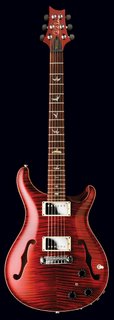 Another rewarding day at the studio on saturday. We finished Eveningstar's guitar and synth parts. I got my first chance to play my prized PRS Hollowbody on tape. To my surprise, it works on both clean and high distortion lead parts. You can play a jazzy rhythm part and a creamy, distorted solo part on the same instrument.
Another rewarding day at the studio on saturday. We finished Eveningstar's guitar and synth parts. I got my first chance to play my prized PRS Hollowbody on tape. To my surprise, it works on both clean and high distortion lead parts. You can play a jazzy rhythm part and a creamy, distorted solo part on the same instrument.Looking forward to hearing a final mix. Krisse played some mean synths. He was especially creative in the supporting rhodes behind the guitar solo. His ARP-sound synth solo is a gem, both in terms of how it helps the song to progress towards the finale and as a standalone solo. Understated, melodic, and it tells a story.
I have been listening to John Coltrane's last studio masterpiece, Interstellar Space, a series of duets with drummer Rashied Ali. This monument to improvisational dialogue was reconmmended to me by Matt, a fellow philosopher-cum-organizational scientist. While the duo format makes the listening experience perhaps a bit easier than Coltrane's other free jazz explorations such as Ascension or Meditations, still it's striking how free jazz demands a form of surrender to the music: it cannot be appreciated from an angle where the music is used as a servant: to soothe an anxious mind or provide a pleasant background. Free jazz embraces the listener.







